Is your sweetheart somewhat scientific? Do you simply have total chemistry with your cute companion? Or perhaps your little guy is just a bit nerdy?
In any case, a totally cool chemistry-inspired word or phrase may make perfectly fitting name for your furry friend.
Below, we’ll share some of our favorite dog names inspired by chemistry so that you can find a great name that captures your curious canine’s spirit!
Male Chemistry Dog Names
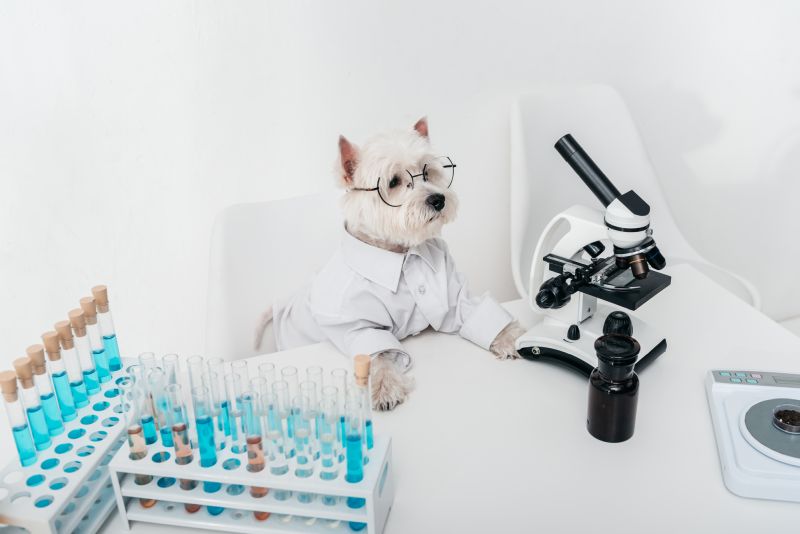
Do you have serious chemistry with your best buddy? Check out some of these chemistry dog names for boys.
- Alkane: Hydrogen and carbon atoms arranged in a tree-like structure
- Amino: Short for amino acid
- Amu: Stands for atomic mass unit
- Anion: Ions with a negative charge
- Atom: The smallest unit of matter
- Base: A substance with a pH greater than 7 that reacts with acids
- Bond: A chemical link between atoms
- Conductor: A material that helps promote the flow of energy
- Dipole: The separation of magnetic charges
- Ion: An atom with a net electrical charge
- Ferrous: Something that contains iron
- Fuse: To combine particles to form a new compound
- Gas: Matter that has no shape or volume
- Isomer: Two or more compounds that have the same formula but with different atomic arrangements
- Kelvin: A base unit of temperature
- Lipid: Fat-soluble molecules
- Mole: The chemical mass unit equal to 6.022 x 1023 molecules
- Moiety: Part of a molecule shared by more than one molecule
- Nucleus: The dense region of the atom containing protons and neutrons
- Osmo: Short for osmosis or the diffusion of water
- Rad: A unit of radioactivity
- Sievert: A measure of radiation
- Titrant: A substance used to determine concentration in another substance
- Vapor: A gas substance that normally exists as a solid or liquid depending on the surrounding conditions
- Volt: Short for voltage
Female Chemistry Dog Names
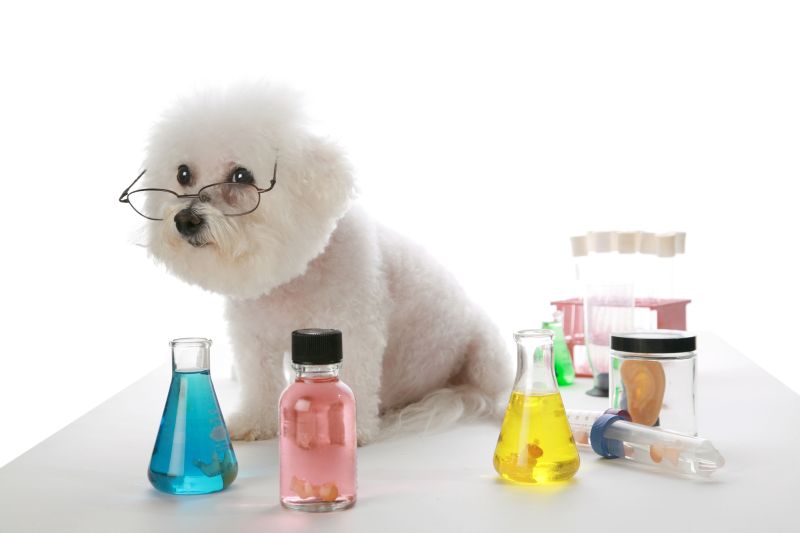
Does your sweetheart embody the scientific spirit? Here are some chemistry dog names for girls to consider.
- Acid: A compound that increases H+ ions when dissolved in water
- Anode: A negative electrode
- Burette: A piece of lab equipment used to determine volume of a liquid or gas
- Catalyst: A substance used to boost a chemical reaction
- Cation: An ion that has a positive charge
- Proton: A subatomic particle that is positively charged
- Diode: Semiconductors that only allows currents to flow in a single direction
- Entropy: A measurement of uncertainty
- Ether: A class of organic compounds
- Floc: A small mass created through suspending particles
- Fluorescence: Light energy that’s released when an atom absorbs electromagnetic radiation
- Matter: Any substance that has mass and takes up space
- Joule: A unit of energy
- Ketone: A specific substance group surrounding the presence of carbonyl
- Kinetic: Energy in motion
- Solute: A substance dissolved into a solution
- Valence: The maximum amount of bonds
Gender-Neutral Chemistry Dog Names
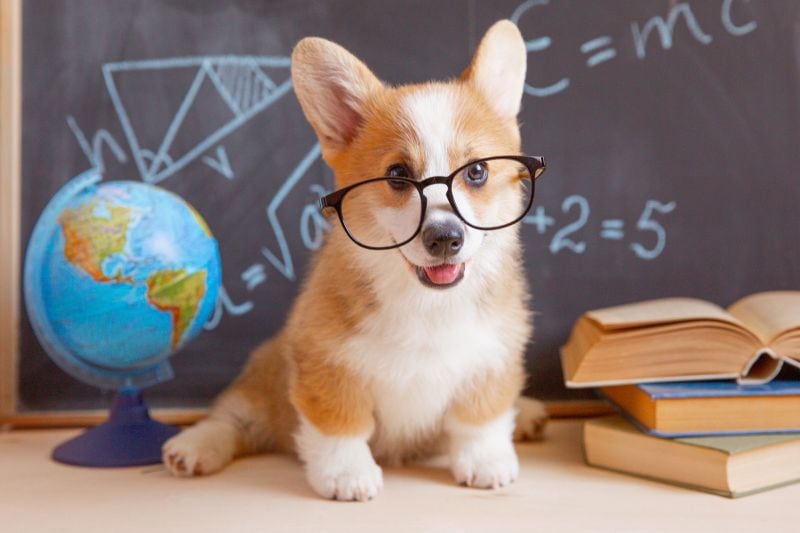
Whether your curious canine is a boy or girl, these gender-neutral chemistry dog names are certainly worth considering.
- Aqueous: A system containing water
- Azeotrope: Something that holds its chemical composition when distilled
- Beaker: The measuring glass used in laboratories
- Chiral: The property of asymmetry of a molecule or ion
- Covalent: A bond type characterized by sharing electrons
- Electron: A negative subatomic particle
- Flux: A material used to facilitate soldering
- Fusion: Combining lighter atomic nuclei to create a heavier nucleus
- Formula: The roadmap of an particular compound or particle
- Isotope: Two elements with the same amount of protons but different neutrons
- Neutron: An uncharged subatomic particle
- Lumo: After LUMO, which is a type of molecular orbitals
- Micro: A prefix that means one millionth
- Monomer: The subunit or building block of a polymer
- Node: Where electron probability is at zero
- Orbit: To go around
- Photon: A particle carrying light energy
- pH: A measure of acidity or basicity
- Ribozyme: An RNA molecule that acts like a protein
- Solvent: What something is dissolved into
- Torr: A unit of pressure
- Zero: After the lowest possible temperature, absolute zero
Still not feeling inspired? Don’t forget to check out our article on the best nerdy dog names too!
Chemistry Dog Names Inspired By The Elements

If you love the periodic table as much as your pooch, it might make sense to name your four-footer after one of the elements. Here are some elements that might make great names.
- Aluminum: A lightweight, silvery-white metal
- Argon: The most prevalent noble gas
- Antimony: A gray metalloid
- Barium: A highly reactive earth metal
- Benzy: Short for the benzene element
- Beryll: After beryllium the lightweight earth metal
- Boro: Short for boron the crystalline metalloid
- Bromine: A light halogen
- Campho: The highly flammable element
- Calcium: A common alkaline earth metal
- Cerium: A ductile silvery-white metal
- Cesium: A soft, silvery-golden metal
- Cobalt: The hard, lustrous silver and white metal
- Copper: A ductile metal that’s highly conductive
- Einstein: Short for einsteinium, a metallic and radioactive actinide
- Europium: A highly reactive lanthanide
- Fluorine: The lightest halogen and the most electronegative element
- Franc: Short for Francium, a rare, radioactive alkali metal
- Helium: The first noble gas in the periodic table
- Holm: After holmium, a rare earth element
- Hydrogen: The lightest element
- Iodine: The heaviest stable halogen
- Ruth: Short for ruthenium, a transition metal
- Gally: Short for gallium, a soft, silvery metal
- Germanium: A hard-brittle metalloid
- Gold: Noted as Au on the periodic table
- Iron: The fourth most abundant element
- Lead: A dense, heavy metal
- Lithium: A soft, silver-white alkali metal
- Neon: A noble gas with the lowest liquid range
- Nicky: After nickel, a hard and ductile transition metal
- Nitro: Short for nitrogen, the most plentiful element in Earth’s atmosphere
- Nobel: Short for nobelium, a synthetic chemical element
- Mercury: An element otherwise known as quicksilver
- Seaborg: Short for seaborgium, a synthetic element
- Silicon: A semiconductor and metalloid
- Sulfur: An abundant, non-metallic element
- Oga: Short for oganesson, a synthesized element notated as “Og”
- Oxy: Short for oxygen, a highly reactive nonmetal
- Pal: Short for palladium, a rare silvery-white metal
- Platinum: A dense, ductile metal
- Promethium: An extremely rare chemical element
- Pluto: Short for plutonium, an actinide metal with a silvery-gray appearance
- Polo: Short for polonium, a rare and highly radioactive metal
- Potassium: An silvery-white element and nutrient
- Rhodie: Short for rhodium, a rare, silvery metal that’s a part of the platinum group
- Sama: Short for samarium, a hard silvery metal
- Sele: Short for selenium, a non-metal
- Sodo: After sodium, a highly reactive metal
- Tanta: After tantalum, a blue-gray metal
- Tin: Another name for aluminum
- Titanium: A ultra-strong metal
- Tungsten: A rare, dense metal
- Vana: Short for vanadium, a hard malleable transition metal
- Xenon: A colorless, dense noble gas
- Zinc: A slightly brittle metal
- Zirc: Short for zirconium, silver-gray transition metal
Chemistry Dog Names Inspired By Famous Chemists

These names inspired by famous chemists and scientists may make the perfect namesake for your smart sweetheart. Like these names? Check out our full collection of scientist dog names based on the famous scientists of past and present!
- Allene: Allene Jeanes was a chemist who developed Dextran which was a substance that replaced blood plasma throughout the Korean war.
- Alfred: Alfred Nobel was a chemist and inventor who held an impressive 355 patents in his lifetime.
- Alice: Alice Ball created the “ball” method which proved to be an incredibly effective treatment for leprosy.
- August: August Kekule created the structural theory of organic composition.
- Avogadro: Amedeo Avogadro formulated the law that states that all gasses have the same number of molecules per volume at the same temperature.
- Boole: Lucy Boole was the first female chemist to research pharmacy in England.
- Boyle: Robert Boyle is considered one of the pioneers of chemistry and the scientific method.
- Carl: Carl Scheele discovered oxygen which he named “fire air”.
- Chatelier: Henry Chatelier created the principle of chemical equilibrium.
- Crick: Francis Crick paved the way to identify the double helix structure of DNA.
- Dmitri: Dmitri Mendeleev created the periodic table of elements.
- Dorothy: Dorothy Hodgkin identified the atomic structures of insulin and penicillin using X-ray crystallography.
- Fredrick: Frederick Soddy is largely accredited with identifying the role of isotopes.
- Fritz: Fritz Haber created a way to synthesize ammonia with nitrogen and hydrogen gas.
- Gerty: Gerty Cori uncovered the process of sugar metabolism.
- Gertrude: Gertrude Elion helped develop drugs to treat leukemia.
- Harold: Harold Urey worked closely with isotopes which led to his discovery of deuterium.
- Hazel: Hazel Bishop was a chemist known for her creation of the first long-lasting lipstick.
- Hess: Germain Hess created the law of heat summation.
- Humphry: Humphry Davy created the Davy lamp and discovered chlorine and iodine.
- Rachel: Rachel Lloyd was the first woman to earn a doctoral degree in chemistry.
- Raoult: François-Marie Raoult created a law surrounding physical chemistry.
- Kathleen: Kathleen Lonsdale developed X-ray techniques to study crystal structure.
- Linus: Linus Pauling discovered the nature of the chemical bond.
- Louis: Louis Pasteur was known for his discoveries surrounding pasteurization and vaccination.
- Marie: Marie Curie discovered two radioactive elements: radium and polonium.
- Mario: Mario Molina discovered the Antarctic ozone hole.
- Otto: Otto Hahn is known as the father of nuclear chemistry.
- Peter: Peter Debye helped determine how electrical charges are distributed in a molecule.
- Percy: Percy Julian discovered how to synthesize progesterone, testosterone, and cortisone.
- Roald: Roald Hoffman developed four theories surrounding chemical reactions.
- Stephanie: Stephanie Kwolek invented Kevlar, a heat-resistant synthetic fiber.
- Svante: Svante Arrhenius created the electrolytic theory of dissociation.
- Wilhelm: Wilhelm Oswald is considered the father of physical chemistry.
***
We certainly have chemistry with our furry family members, so it makes sense that some of us may be inclined to name our sweethearts after the field or influential figures within it. Any of these names are sure to make a great fit for your curious canine.
Did none of these names quite feel right? Try checking out our collection of space dog names and video game dog names for more inspiration!
Which chemistry dog name was your favorite? How does your dog embody the scientific spirit? We’d love to hear all about it in the comments below!
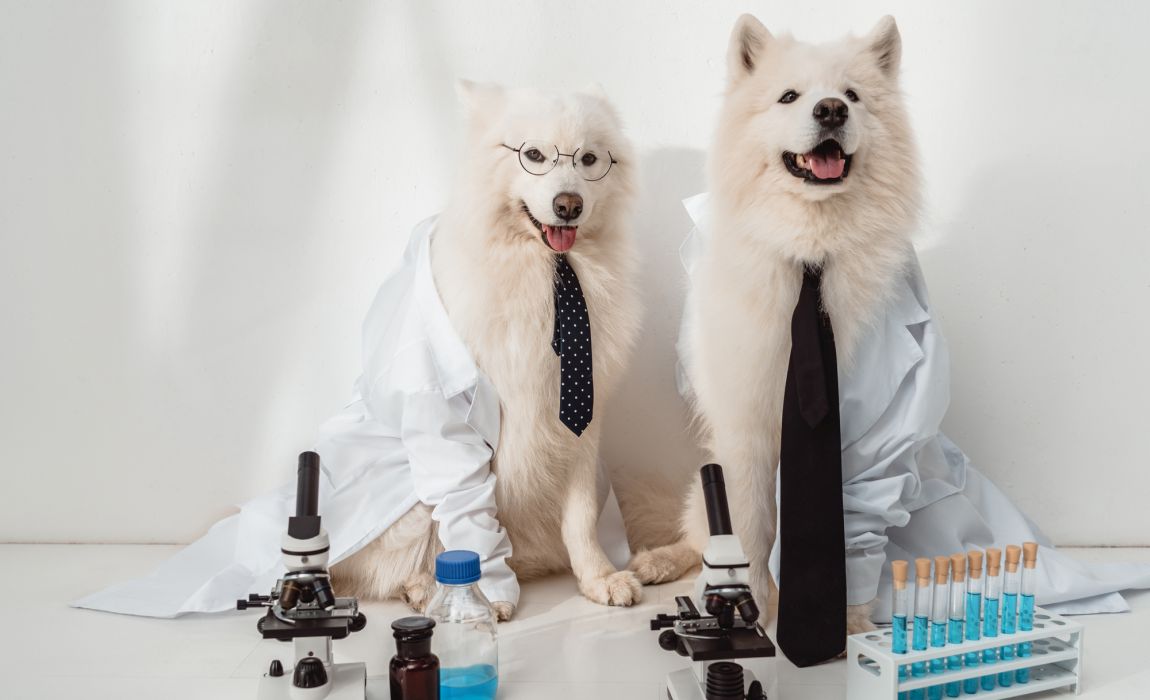






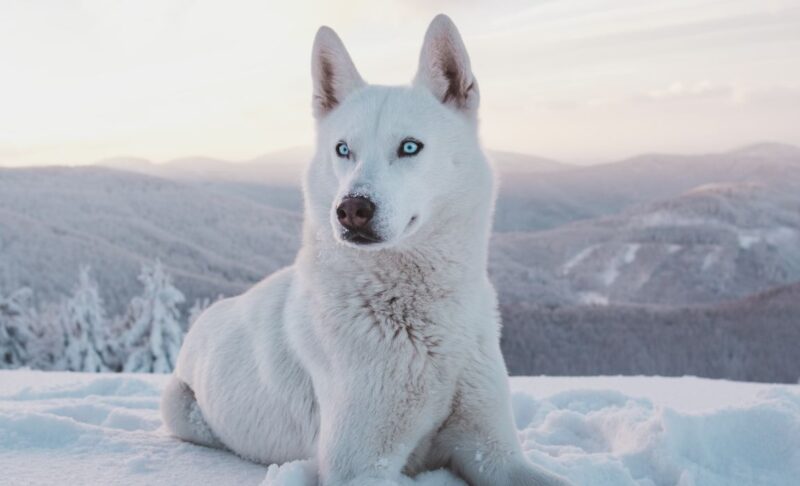
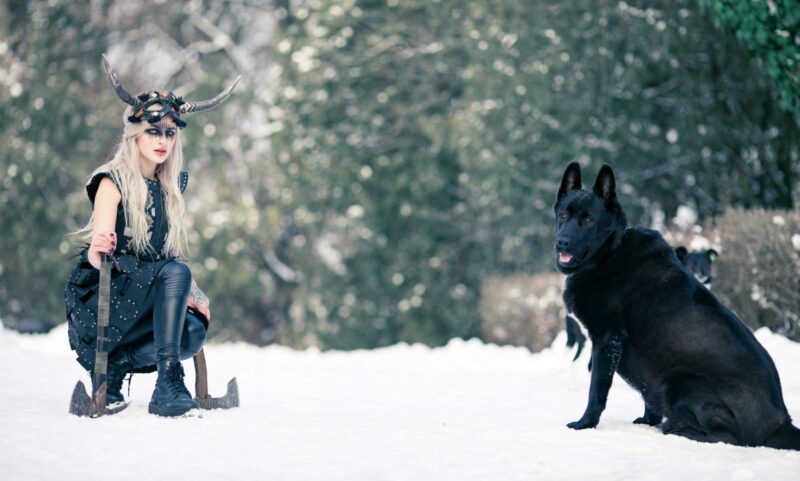




Leave a Comment